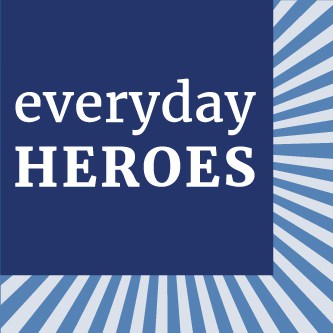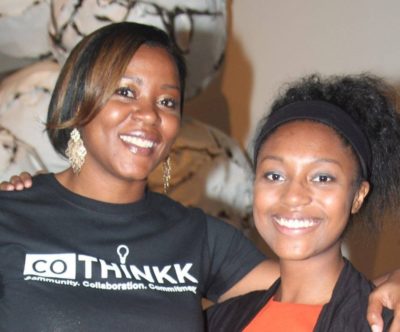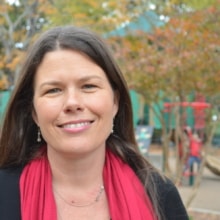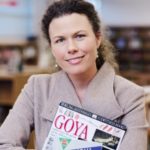
If you don’t know her already, meet Tracey Greene-Washington.
Tracey is a program officer at the Z. Smith Reynolds Foundation, taking the lead on the Foundation’s community economic development portfolio of grants. Her eyes light up when she is excited.
And Tracey is excited about philanthropy, and the role it can play in changing communities. She is excited about her hometown, Asheville. She is excited about innovative strategies to create change.

Back in 2014, on her own time, Tracey founded CoThinkk, “a giving circle that invests its time, talent, and treasure to accelerate positive changes in communities of color in Asheville and Western North Carolina.” There was a launch event, and then monthly meetings, annual retreats, and capacity building workshops.
This work takes community. It takes collaboration. It takes commitment.

Tracey has been committed to this work since middle school. She grew up on Fayetteville Street in the Burton Street community of Asheville, an African-American neighborhood founded in 1912.
In middle school, Tracey was invited to attend a Valentine’s Day party at a country club in a more affluent part of Asheville. As her mother drove her to the party, she noticed the trees. The roads were smooth. The houses seemed shiny and new. On the way home, the differences in her own community shook Tracey to her core. No landscaping. The streets had not been paved in years and were riddled with potholes. Not all of the street lights had bulbs. The houses were smaller, older. She tells me, “they seemed to have experienced a lot of living and had a wear to them.”
Tracey asked herself why. Why did these neighborhoods in the same city look so different? “At this very young age,” Tracey says, “I understood and believed that everyone should have the same opportunities and should be afforded the ability to create a future for their families and communities where they are all thriving economically and socially.”
Ask questions. Seek answers. Create solutions.
The arc of Tracey’s work and her life has been defined by this single experience, inspiring her motto: “If you don’t like something, change it. And, if you can’t change it, change the way you think about it.”
That is what I am doing at CoThinkk, Tracey says. “Changing the narrative and the norm so that collectively all of the efforts can yield equitable opportunities and create a new legacy for generations to come.”
“Make no little plans. They have no magic to stir men’s blood and probably themselves will not be realized. Make big plans; aim high in hope and work, remembering that a noble, logical diagram once recorded will never die, but long after we are gone will be a living thing, asserting itself with ever-growing insistency. Remember that our sons (and daughters) and grandsons (and granddaughters) are going to do things that would stagger us. Let your watchword be order and your beacon beauty. Think big.” Daniel Burnham, Chicago architect, 1864-1912, a quote on the Burton Street Community Plan that Tracey gives me to help understand her neighborhood and the importance of communities

When I talk to Tracey, I have to keep my phone handy so I can google words or phrases I don’t understand as she talks. In her work, vocabulary matters.
To get leaders from different communities to work comfortably — and uncomfortably — together, Tracey noticed from the beginning the need for a common language.
The name CoThinkk was coined to describe a process to foster co-thinking among individuals, organizations, institutions, and sectors to build konnections and knowledge.
A giving circle, Tracey tells me, allows people to pool their resources — financial, time, talent, etc. — and make joint decisions on investments to better their communities.
Even the word philanthropy is being re-conceived. What does it mean to you?
Communities of color is used instead of minorities, which is outdated, negative, and doesn’t lift up the strengths in differences among communities, Tracey says. She points me to a website on The State of Black Asheville, and specifically the education page.
And LatinX (pronounced “La-teen-ex”) is used instead of Hispanic or Latino. According to an article in the Huffington Post, “Latinx is the gender-neutral alternative to Latino, Latina and even Latin@. Used by scholars, activists and an increasing number of journalists, Latinx is quickly gaining popularity among the general public. It’s part of a ‘linguistic revolution’ that aims to move beyond gender binaries and is inclusive of the intersecting identities of Latin American descendants.”

CoThinkk made its first round of investments in the fall of 2016. Grants were available “for community groups that sponsor programming that is led by leaders of color and supports African American and Latinx families and communities through education, economic mobility/opportunity, and leadership development, with particular emphasis on cultivating the energy, passion, and talents of the next generation to create an essential pipeline of leaders.”
Additionally, CoThinkk presented four community leadership awards and highlighted two community allies. “Recipients of the community leadership awards must be leaders of color who are playing a critical role in the social change ecosystem of Western NC and working to shift the narrative of communities of color. Community allies are individuals or organizations who will be recognized for their leadership in working alongside and in partnership with communities and leaders of color.”
The application process was compressed by traditional standards in philanthropy: one month from August 15 to September 15. Video grant applications were encouraged, and they could be submitted in Spanish. And there was a workshop to assist with applications called…
On September 22, Tracey emailed me and her excitement screamed through the email. “We received one video from a teacher, one video from a student, one video about a student program for Latinx communities, one leadership nominee for a freshman college student, and at least 8-9 leadership nominees for community leaders implementing youth programs targeting educational efforts focused on communities of color,” she wrote. Wow, I thought.
Here is a video about the grant applications:
On October 14, Tracey emailed me, “Things are moving fast and our event sold out in less than 3 days!”
And then on October 22 at the Asheville Art Museum, Tracey and CoThinkk awarded five grants totaling $4,500 at an event entitled, “Connecting through the Roots.”

“When we work together we can move things very quickly,” Tracey said in an article about CoThinkk in the Asheville Citizen-Times. “We can move the needle.”
As our social, economic, and political landscape continues to shift, regional grantmaking strategies will become increasingly important to build a better North Carolina. Tracey is leading the way, and her excitement is contagious.
What if in 2017 ground-up philanthropy took hold across North Carolina? Imagine. And then, in your own community, just start.
Here you can learn more about the application and training process used by CoThinkk.
Mebane Rash is the CEO of Education NC and the NC Center for Public Policy Research.
Author’s Note: The Z. Smith Reynolds Foundation is a funder of EdNC, but our funding comes from the education focus area. I first met Tracey when I served on the Foundation’s Community Leadership Council. I believe in her model of philanthropy, and I am investing in CoThinkk.
Economic Development



